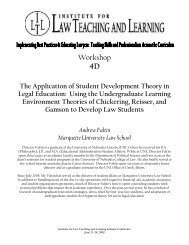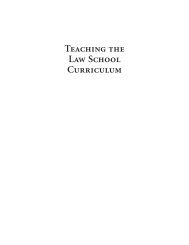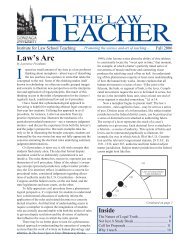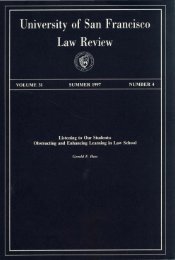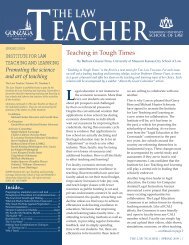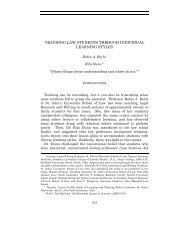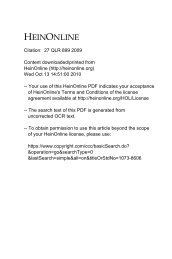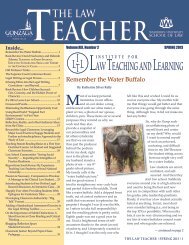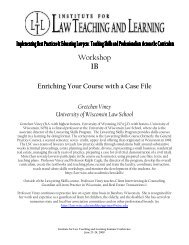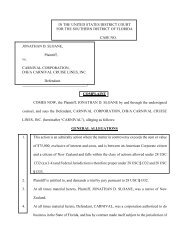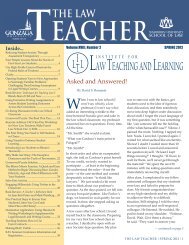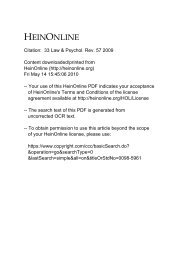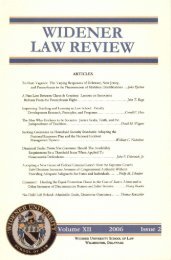The Law Teacher - Institute for Law Teaching and Learning
The Law Teacher - Institute for Law Teaching and Learning
The Law Teacher - Institute for Law Teaching and Learning
You also want an ePaper? Increase the reach of your titles
YUMPU automatically turns print PDFs into web optimized ePapers that Google loves.
Helping First-Year <strong>Law</strong> Students–A Plan <strong>for</strong> Better Retroactive Review<br />
— continued from page 12<br />
will require further study with an aim<br />
of mastering a major topic in a course.<br />
Students must strive to master each<br />
major topic as they complete it. <strong>The</strong>y will<br />
not have time to learn the topic later in<br />
the semester.<br />
Mastery requires that the students<br />
first complete the outline of that topic<br />
<strong>and</strong> then test themselves through<br />
hypothetical questions. hypotheticals<br />
not only test the students’ knowledge<br />
of the law, but they also mimic what<br />
students must do on exams—apply<br />
the law to a new fact pattern. <strong>The</strong><br />
students should not rush through the<br />
hypotheticals. <strong>The</strong>y<br />
need not write<br />
a <strong>for</strong>mal essay<br />
answer, but they<br />
should write enough<br />
to commit their logic<br />
to paper. Students<br />
should check their<br />
analysis by going<br />
back to the original source material—the<br />
case, the rule or the statute at issue.<br />
<strong>Law</strong> students have relatively easy access<br />
to good hypothetical questions. every<br />
time a professor in class varies a fact<br />
pattern of a case, it is a hypothetical. I<br />
recommend that students mark these<br />
fact variations in their class notes <strong>and</strong>,<br />
in their daily or weekly review, copy<br />
them into a separate “hypothetical”<br />
file <strong>for</strong> each course. Students also can<br />
get hypotheticals from their classmates<br />
<strong>and</strong> commercial study aids. Students,<br />
however, should not take the answers<br />
from any source without critical<br />
thinking. <strong>The</strong> point of a hypothetical is<br />
that the question prompts the student to<br />
consider the law in a new way.<br />
Semester review is the last stage<br />
of retroactive review—final exam<br />
preparation. Students must master the<br />
course, by synthesizing all of the topics<br />
together. <strong>Law</strong> students know that exam<br />
study is crucial, but many do not know<br />
how to best use this valuable time.<br />
Students should not use the exam study<br />
period to learn a topic <strong>for</strong> the first time.<br />
<strong>The</strong>y should not spend the exam period<br />
working on or reading their outlines.<br />
Students should spend most of their<br />
exam period on higher intensity learning<br />
—“hyper-learning.”<br />
hyper-learning is very active learning. It<br />
involves manipulation of legal principles<br />
through creation of single-page charts,<br />
decision-trees, flowcharts, checklists <strong>and</strong><br />
summaries. Effective hyper-learning<br />
also requires work on hypothetical<br />
problems. <strong>The</strong> best hyper-learning layers<br />
Students should spend most<br />
of their exam period on<br />
higher intensity learning—<br />
‘hyper-learning.’<br />
the different <strong>for</strong>ms of study. Students<br />
should start with some <strong>for</strong>m of summary<br />
charts. Students next should test their<br />
knowledge through hypothetical<br />
questions. <strong>The</strong>y then should go back to<br />
check the charts’ accuracy <strong>and</strong> consider<br />
new ideas <strong>and</strong> charts. <strong>The</strong>y should<br />
return to the hypotheticals, <strong>and</strong> so on.<br />
Summary charts should not be merely<br />
shrunken versions of the students’<br />
outlines. A good <strong>for</strong>m of final summary<br />
chart is one that compares related<br />
concepts across multiple topics. For<br />
example, I encourage my civil Procedure<br />
students to make a single chart of the<br />
different circumstances in which a court<br />
must decide whether to permit a party<br />
to rectify a procedural mistake. <strong>The</strong>se<br />
decisions occur throughout litigation, but<br />
they have common themes <strong>and</strong> elements.<br />
composition of a chart that collects <strong>and</strong><br />
compares these decisions, along with the<br />
applicable legal factors, gives students<br />
valuable insights. It <strong>for</strong>ces students to<br />
look at the law of procedure in ways<br />
that are not apparent from reading the<br />
material in the linear pattern of the<br />
semester.<br />
Hyper-learning during the final exam<br />
period also includes broad hypotheticals<br />
that cover many topics. <strong>The</strong> ultimate<br />
hypothetical is an old actual exam from<br />
the professor. Students should write<br />
the full answer in essay <strong>for</strong>mat under<br />
the time limits of an actual exam. This<br />
provides an opportunity <strong>for</strong> the crucial<br />
self-assessment: are they ready <strong>for</strong><br />
the actual exam? Some students take<br />
practice exams too early or too late.<br />
Practice exams are best<br />
used during the exam<br />
period, after the student<br />
has done sufficient hyperlearning<br />
to approach the<br />
mastery level, but early<br />
enough to give them<br />
sufficient time to go back<br />
<strong>and</strong> re-study as necessary.<br />
In sum, this plan should help most<br />
students. In another article, I identified<br />
four key needs of beginning law<br />
students. This plan meets all four. It<br />
gives specific advice but is flexible<br />
enough <strong>for</strong> students to adapt to their<br />
own needs. <strong>The</strong> plan explains the<br />
concept of mastery <strong>and</strong> gives concrete<br />
suggestions <strong>for</strong> achieving the mastery<br />
level. It incorporates methods <strong>for</strong> critical<br />
self-assessment. Most importantly,<br />
the plan focuses on the key missing<br />
ingredient of most study advice—<br />
effective retroactive review <strong>and</strong><br />
synthesis.<br />
____________<br />
Carol Andrews is the Douglas Arant<br />
Professor of <strong>Law</strong> at <strong>The</strong> University of<br />
Alabama School of <strong>Law</strong>. She can be reached<br />
at c<strong>and</strong>rews@law.ua.edu.<br />
<strong>The</strong> <strong>Law</strong> <strong>Teacher</strong> | FaLL 2012 | 13



